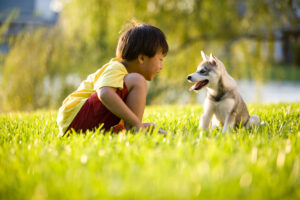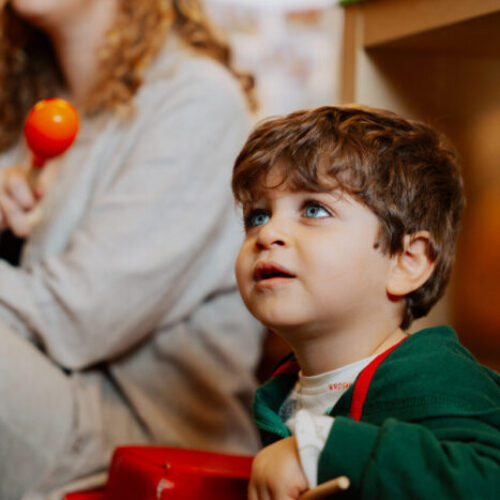The unexpected benefits of pet ownership

Bringing a family pet into the mix can seem to be nothing more than inviting more work into your day, but the benefits they bring often massively outweigh any drawbacks.
Nearly every mum can remember at least one time when their child has pleaded with them to get a family pet. From their point of view, there’s no downside! They get a fluffy, adorable friend that will always be around for a cuddle and to raise their spirits. While it’s never easy to give kids bad news, getting a pet can feel like a huge commitment – especially for something that you think your little one may grow tired of.
However, recent research has shown that having a family pet can help children in many more ways than you might have thought. It is now understood that pets can be a genuine emotional support for children, while offering a whole range of benefits, including lowered stress levels and improved social skills. Here, we dive into the unexpected ways that pet ownership can improve your child’s everyday experience – and perhaps even your own!
Six ways a pet can help your child’s growth
While adopting a pet can bring along lots of new duties, as well as bills, the upside can be huge. Let’s take a look at what a new furry friend can bring to your family!
Provides unconditional love
Anyone with a cat or a dog will speak to the fact that this animal loves them unconditionally. They will always be there to welcome you home with a wagging tail or a purr, which is sure to bring joy to your little one. Regardless of your child’s mood, appearance or social standing, the family pet will show them love and adoration. This can teach children important lessons around acceptance, namely that their self-worth shouldn’t be tied to any external factors, and that they deserve to be loved and accepted just as much as everyone else. After an especially challenging day at school, a cuddle and a play with a pet might be just what your little one needs.
Develops empathy
A pet is a domesticated animal and therefore completely relies on their owners. While cats retain some independent skills, dogs are dependent on you for everything from food to exercise. Many parents make the deal that if they get their child a pet, the child has to contribute to raising them. This can be a really good idea. It encourages children to consider and attend to the pet’s wants and needs. Having to look beyond their own needs is a simple way to introduce the concept of empathy.
Empathy is a hugely important skill that will benefit your child throughout their development. If the family dog is looking for their dinner or their evening walk, help your child to understand that they may be feeling hungry or cooped up at home. Your little one may be able to relate to these emotions and therefore feel empathy.
Counteracts loneliness
For kids, a pet is a fantastic combination of a new family member and a best friend. They’ll always be on your child’s side, up for having some fun and even some gentle cuddles. Loneliness is a problem that no one deserves and pets can do a lot to improve the lives of children who struggle socially. This new furry ally, whether of the canine or feline variety (or even something more unusual!) can certainly help your little one if they’re experiencing feelings of loneliness.
Many parents notice their children speaking to the family pet. Lots of kids feel like they can truly open up to them, and they might even share fears or anxieties that they would otherwise keep to themselves. This avenue for expression can help your little one fight off any feelings of loneliness and give them the confidence to talk about their problems.
Reduces stress
Life is full of challenges and being a child or a teenager can be particularly difficult. From staying on top of school work and managing socially, to simply trying to figure out who they really are, there are a lot of stressors that go hand-in-hand with growing up. One lovely aspect of having a family pet is the de-stressing nature that they can bring into a household. Their positive attitude and easygoing behaviour can serve as a reminder to embrace the day with happiness.
Furthermore, playing with a pet has been shown to genuinely reduce stress levels by encouraging your brain to release oxytocin and dopamine. So, petting a dog or stroking a cat can truly help your child to return to a happy, calm state.
Fosters responsibility
Developing responsibility can be tricky for children. In order for them to grow in this way, they need to be given responsibility for something, but it may be difficult to trust them if they haven’t proven that they’re responsible. Passing over some of the jobs relating to caring for a family pet is a good place to start.
If your child commits to taking over the dog-walking duty for example, this is an arena where they can demonstrate that they are able to take the necessary actions, and that they’re ready to take on more. You can see this as a proving ground, rolling out more pet responsibilities to your little one. It’s great practice for them and it gives them a chance to show you what they’re capable of!
Encourages exercise
Getting a new pet will likely increase your little one’s amount of exercise, especially if it’s a dog. Most dogs need to be walked twice a day, and this can help you and your loved ones to incorporate some outdoor family time into each day. All kids love to play and pets can be the perfect play partners. Whether it’s running around with the dog or entertaining the cat with a range of toys, there are countless ways for your little one to get their heart rate up.
If your family likes taking long walks on the weekend, a family dog can bring a renewed sense of fun to these excursions. Previously, a child who may have become bored of such a walk, now has a fluffy friend to bound alongside, reaping all the benefits of fresh air and movement.
Before you adopt
As exciting as it can be, getting a pet is not something you should do on a whim. Doing an adequate amount of research is key and there are numerous considerations to take into account. Remember that, even if your child has convinced you to go ahead and adopt, the bulk of the responsibility will fall at your feet. Bearing the following in mind will help to inform your decision.
Your home
The type of home that you live in will help to determine what kind of pet, if any, that will be suitable for you. For example, big dogs and small apartments tend not to be a good fit. A smaller dog or a cat may be a better option if space is limited.
Lifestyle
Different pets suit different lifestyles. If you and your family love getting outdoors, then a physically fit dog can be a great choice and may soon become your new favourite running buddy. On the other hand, cats are a strong option for very busy families as they tend to be much more independent and self-sufficient.
Costs
Simply put, having a pet is not cheap! The basics of food, bedding and toys can cost a surprising amount, and that’s before you consider medical bills, pet sitters for when you’re travelling and any pet training you may wish to send your new four-legged friend on.
Before taking this step, consult with professionals in the field, including a veterinarian and your child’s doctor, to make sure that you’re taking everything into account. It’s clear that adopting a pet can bring so much joy and plenty of benefits to your whole family. Granting your child’s wish for a new best friend might just be one of the best decisions you’ve ever made!
Image Credit: Shutterstock











Comments